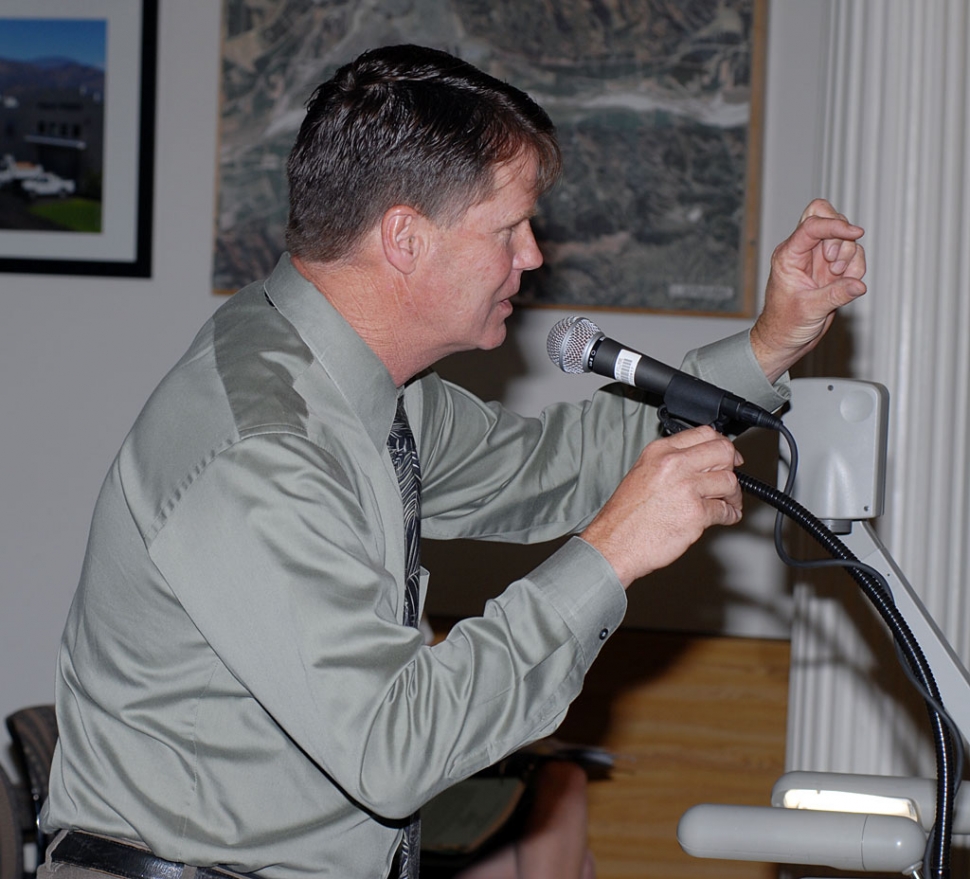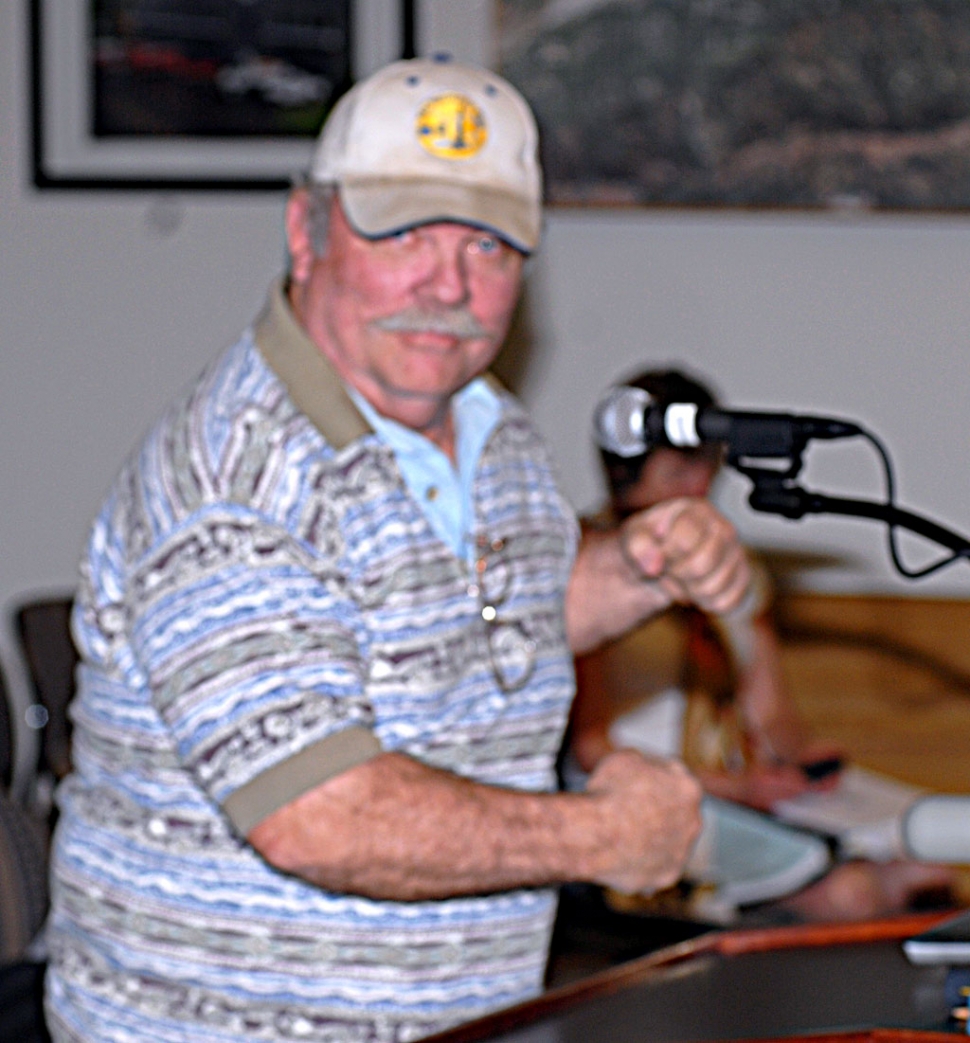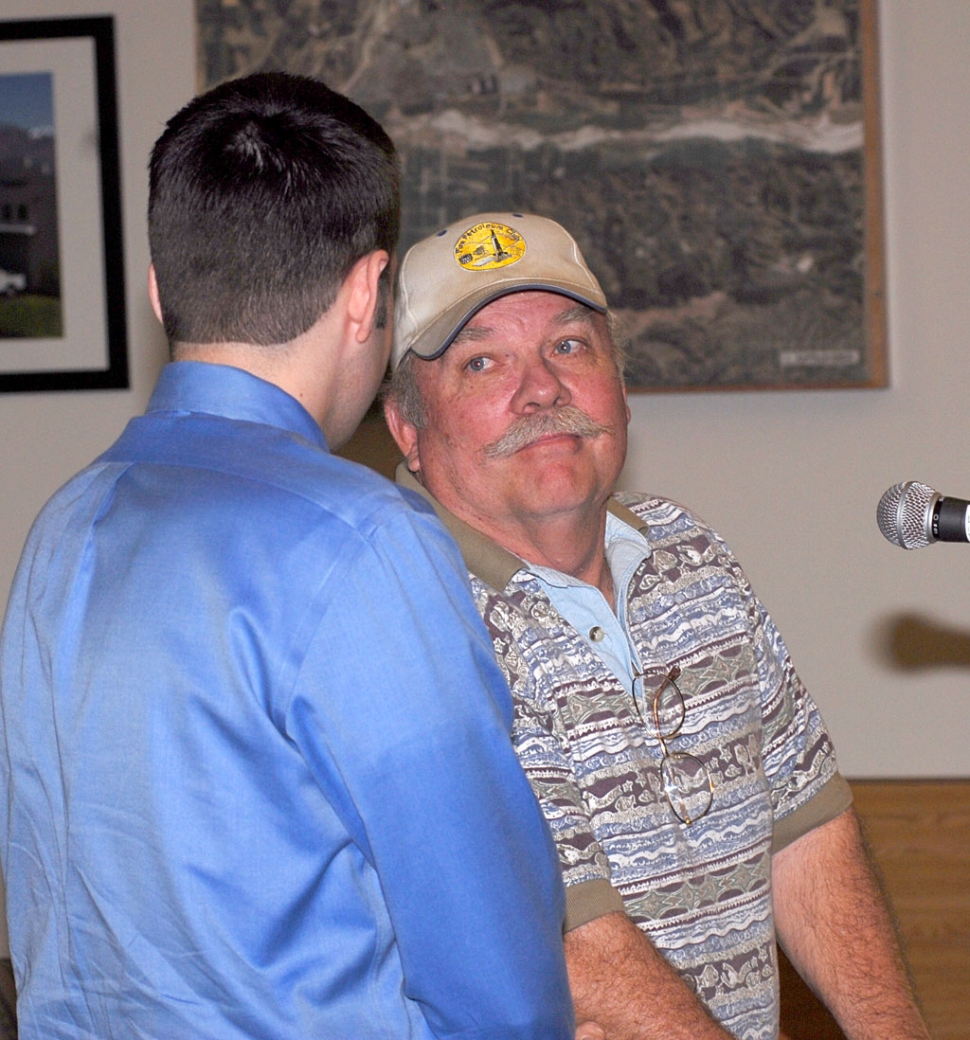
Roger Keller, owner Nannette Keller Fashion.

Fillmore Police Chief Tim Hagel praises the on-going program for properly disposing of all sorts of unused and unwanted drugs.

Gary Creagle poses for the press.

Gary Creagle gives his speaking time to Brian Sipes during Tuesday's council meeting.
Public Forum
Fillmore City Council met Tuesday, April 13, 2010. It was highlighted with an emotional condemnation from Roger Keller, reiterating the damage Measures H & I have wreaked on his north Fillmore business, Nannette Keller Fashions. Keller deliberately addressed Measure supporters Mayor Patti Walker, Councilman Jamey Brooks and Mayor Pro-tem Gayle Washburn, pointing his finger at them, saying the Measures rendered his property worthless.
Prescription Drug Turn-In Program
In only three months of operation, the Prescription Drug Turn-In program held at the Police Station has yielded 32 lbs of unwanted prescription drugs which it then properly disposes. With its no-questions-asked policy of accepting everything from baby aspirin to narcotics, the program helps to make households safer. “It’s been a huge success,” said Chief of Police Tim Hagel, thanking the City Council and citizens of Fillmore for their support.
Presentations
Brian Sipes of Market Mortgage presented the Senior Center with a $500 donation. Senior Center Board President Marie Wren accepted the gift, earmarking it for the Center’s salad bar program.
Senior Center Business and Discussion Items
Senior Center Board President Marie Wren spoke of the Center’s growth from serving 100 visitors per month at its inception two years ago to over 800 last March. Its salad bar is not part of the subsidized federal nutrition program. Wren had estimated it would cost about $25,000 annually, but the program has expanded to being held both Tuesdays and Thursdays. Funding comes from the Redevelopment Agency, and the Fillmore Women’s Service Club provides $100 monthly. Wren encouraged donations of avocados and spring garden vegetables to support the salad bar. Wren noted that the Senior Center, serving citizens over 55 and offering subsidized programs for citizens over 60, has only two paid employees and is otherwise run by volunteer efforts.
Wren also announced the need of various upgrades for the Fillmore Senior Center, including 50 new dining room chairs, restroom renovations, and especially automatic access doors for visitors with walkers and wheelchairs.
Senior Treasurer Dave Roegner announced that the Senior Center’s computer program has graduated 60 students thus far. Classes, held Mondays 10-11:30 am, include learning how to operate the computer, using the mouse, navigating the Internet, making and saving files, and keyboarding. He invites interested seniors to attend the “open class” held Thursday from 10:00 to 11:30 am for individual help. The lab now boasts a set of eight Mac computers, a projector, and laptop. Roegner is considering to put on a Paintshop Pro class and hopes to acquire more ergonomic individual computer desks.
City Council Business Items
Business License Fee Prorating
Transitional Finance Director Anita Lawrence recommended revising the current Fillmore Municipal Code to allow prorating of the business license fee for a trail period of three years to augment economic development efforts. The present Municipal Code does not allow adjusting the license fee, so that if a business were to start in April, it would pay the current year’s full fee and the new fiscal year’s fee in July. The measure would be more business-friendly and consistent in practice with cities in the area. Lawrence indicated that the fee is relatively low, and the potential annual revenue loss would amount to $6,790.
Councilwoman Laurie Hernandez expressed her support to help businesses while Brooks suggested dropping the three-year trial period. Councilman Steve Conaway stated the proposal sounded “fair and balanced,” noting that he preferred the quarterly prorate and advised retaining the trial period. Walker registered her support, mentioning Auntie’s Attic as an example of a local business that could have benefited from such a measure. Washburn stated, “Why don’t we be like everyone else.” Conaway also recommended adding anything less than two quarter’s of a year with the following year’s fee to minimize billing. Council passed 5-0.
Updated Signage for Highway 126
Community Development Director Kevin McSweeney announced that merchants have suggested that improved signage along Highway 126 would better direct traffic to downtown businesses. McSweeney reminded the Council that one of its top goals established at the Strategic Goal setting session held March 16, 2010 was to improve the local economy by providing signage. Department staff recommended the City Council request a proposal from Graphic Solutions for the design concept of two signs along Highway 126 to replace the temporary signs.
Councilwoman Laurie Hernandez requested the Staff bring in more than one company; Councilman Steve Conaway expressed his support of Hernandez, citing the power of competition to spur creativity. City Attorney Ted Schneider advised getting written statements for extended leases on the properties at the east and west ends of the city where the temporary signs currently stand. Three different areas were identified as potential sites for the new signs, including the city-owned site at of the old Welcome to Fillmore sign (which was run over by an 18-wheeler) at Pole Creek Park.
Call for Moratorium
City Attorney Ted Schneider proposed an interim urgency ordinance imposing a citywide moratorium on the establishment and operation of medical marijuana dispensaries in light of recent inquiries from individuals and their legal representatives desiring to establish medical marijuana dispensaries in Fillmore.
While federal law classifies marijuana as an illegal drug, California voters adopted the Compassionate Use Act, which allows patients and caregivers to possess or cultivate marijuana for medical purposes. Many cities in California have elected to prohibit or heavily regulate marijuana dispensaries. The City of Anaheim’s ban of medical marijuana dispensaries was challenged in court, and the case is on appeal. There now exist moratoriums throughout the area prohibiting the establishment of dispensaries pending resolution of these conflicts.
Schneider announced that in the last several weeks, an initiative qualified on ballot for adults over 21 to be able to have, for any reason, an ounce of marijuana on them. He also mentioned the proliferation of dispensaries’ posing a risk to public’s health, safety, and welfare, including concerns of burglaries, crime, and impact on public safety.
The ordinance would last for 45 days, with the possibility for an extension of 10 more months and 15 days with a public hearing, plus a 12-month extension.
Other cities in the county, with the exceptions of Ojai, Port Hueneme, and Santa Paula, have adopted moratoriums, then bans. Ventura’s moratorium remains in effect, and Thousand Oaks has not received a dispensary application and has yet to adopt any measure.
Citizen Dwight Moore prefaced his public comment asserting that he doesn’t even take medicine; “If you called me a Puritan, I’d be happy.” However, he noted that Fillmore is already the county’s go-to place for fireworks, and “we make a good deal from it.” He claimed the idea of establishing dispensaries in Fillmore would be “outrageous.” He doesn’t know anyone who uses marijuana or would want to. “But we could turn this into a moneymaker.”
Councilman Conaway moved to adopt the measure, Councilwoman Hernandez seconded, and the vote was passed unanimously. Mayor Patti Walker assured Moore that the City would be “looking at all avenues.” Said Hernandez, “I agree with Dwight.”




